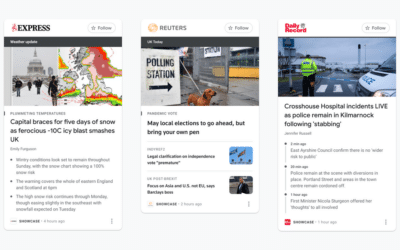Data intelligence firm Braidr has warned that marketing chiefs must act quickly to cope with Google’s planned ditching of 3rd party cookies, despite the online giant delaying the move until 2024 last week.
Braidr analysed the Twitter profiles of more than 15,000 CMOs and similar professional roles across the UK and US over the past 12 weeks, and found that fewer than one per cent (0.83%) of CMOs in the US, and even less in the UK (0.25%), have been engaging in crucial discussions about the cookieless future and the significant impact the shift will have on their businesses.
The study found that the vast majority are failing to discuss the impact that the loss of 3rd party cookies and increased privacy demands will have on marketing, and by association company finances, if not mitigated imminently.
Dora Moldovan, co-founder and managing director of Braidr, said: “Despite Google announcing a short delay, the next e-generation is looming incredibly fast, where everything that we’ve learned over the past 20 years, and the tools we know are going to disappear, yet CMOs are talking mostly about AI, the Metaverse and Elon Musk.
“While these topics are exciting and sometimes entertaining, none of them will have such an immediate impact on the bottom line as the sunset of 3rd party cookies.”
Since Apple announced changes that make Identifiers for Advertisers (IDFAs) significantly less valuable than before, marketers have seen changes to their marketing costs and outcomes affected, especially on Facebook ads, and this is set to amplify once Google removes 3rd party cookies from its Chrome browser.
Meta last week announced its first ever decline in revenues, blamed partially on Apple’s privacy changes, which make it harder for Meta to harvest user data for its targeting algorithms.
This is hurting not only advertisers but also the platforms themselves. The advice to marketers given by Google and Facebook is to turn to measurement, attribution, and activation of 1st party data.
Yet Braidr’s study of Twitter discussions among senior marketers shows that few are giving the subject the consideration it requires. Instead, 20 per cent of UK CMOs are engaged in discussions about business strategy, while data issues, such as business transformation, feature in 15 per cent of marketers’ Twitter conversations, a similar number to those in the UK discussing Elon Musk.
Braidr’s report adds that the ultimate victim will be bottom lines, especially for smaller businesses who will be paying much higher sums to reach less users than previously. It says the answer lies with data: from the way businesses approach tracking (moving towards server-side and API based) to implementing Google Ads Enhanced Conversions and FaceBook’s CAPI to using alternative products that are able to collect data without full reliance on cookies, as well as attribution and marketing mix models and the holy grail of the cookieless future – 1st party data activation.
Braidr, part of the Tomorrow Group, conducted its analysis by continually ‘listening’ to Twitter via the social media platorm’s API. It collected the conversations of just over 15,000 CMO (and CMO-type) profiles. The analysis was then achieved by applying state-of-the-art topic modelling and machine learning to distil over 600,000 distinct tweets from CMO timelines into themes and insights.











